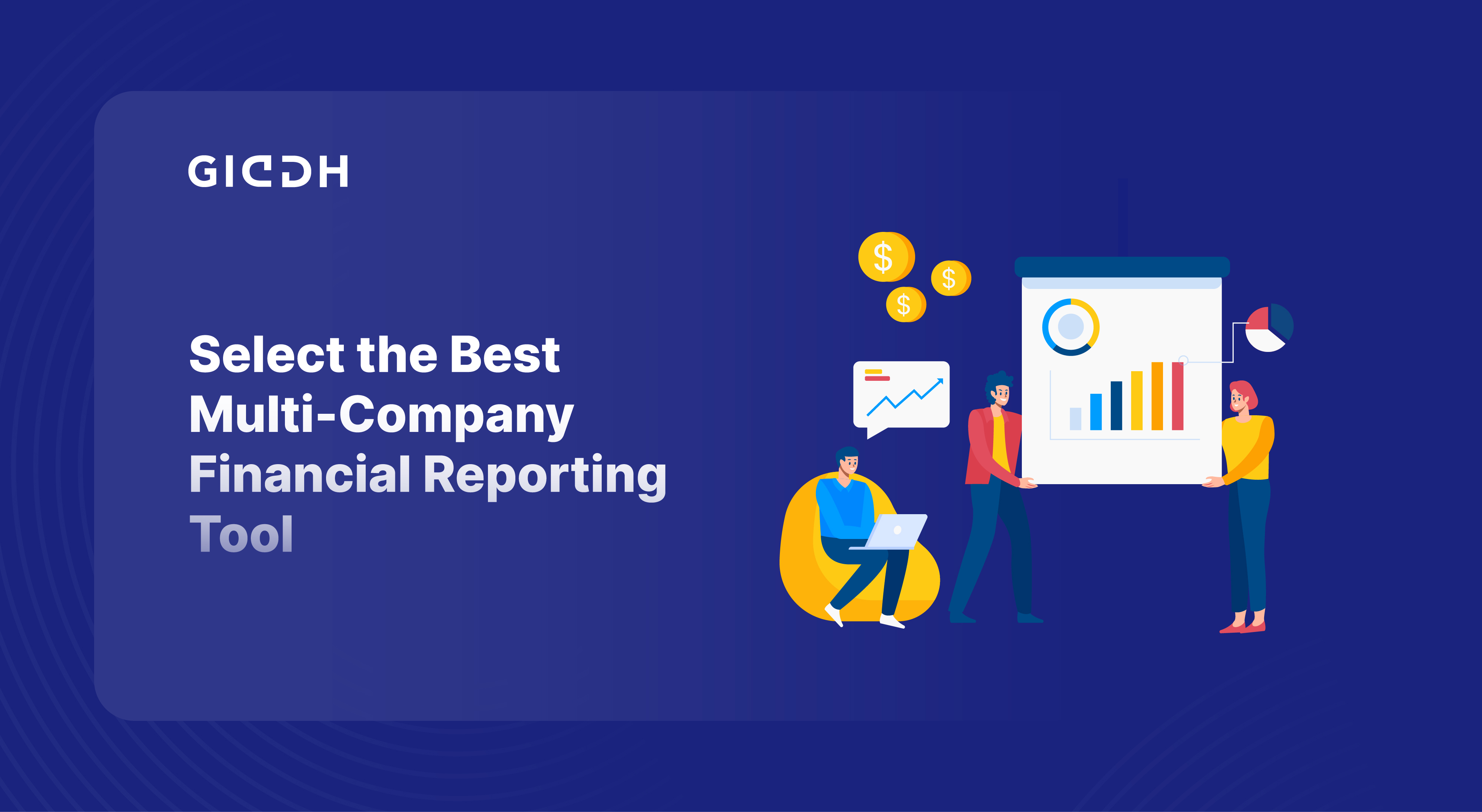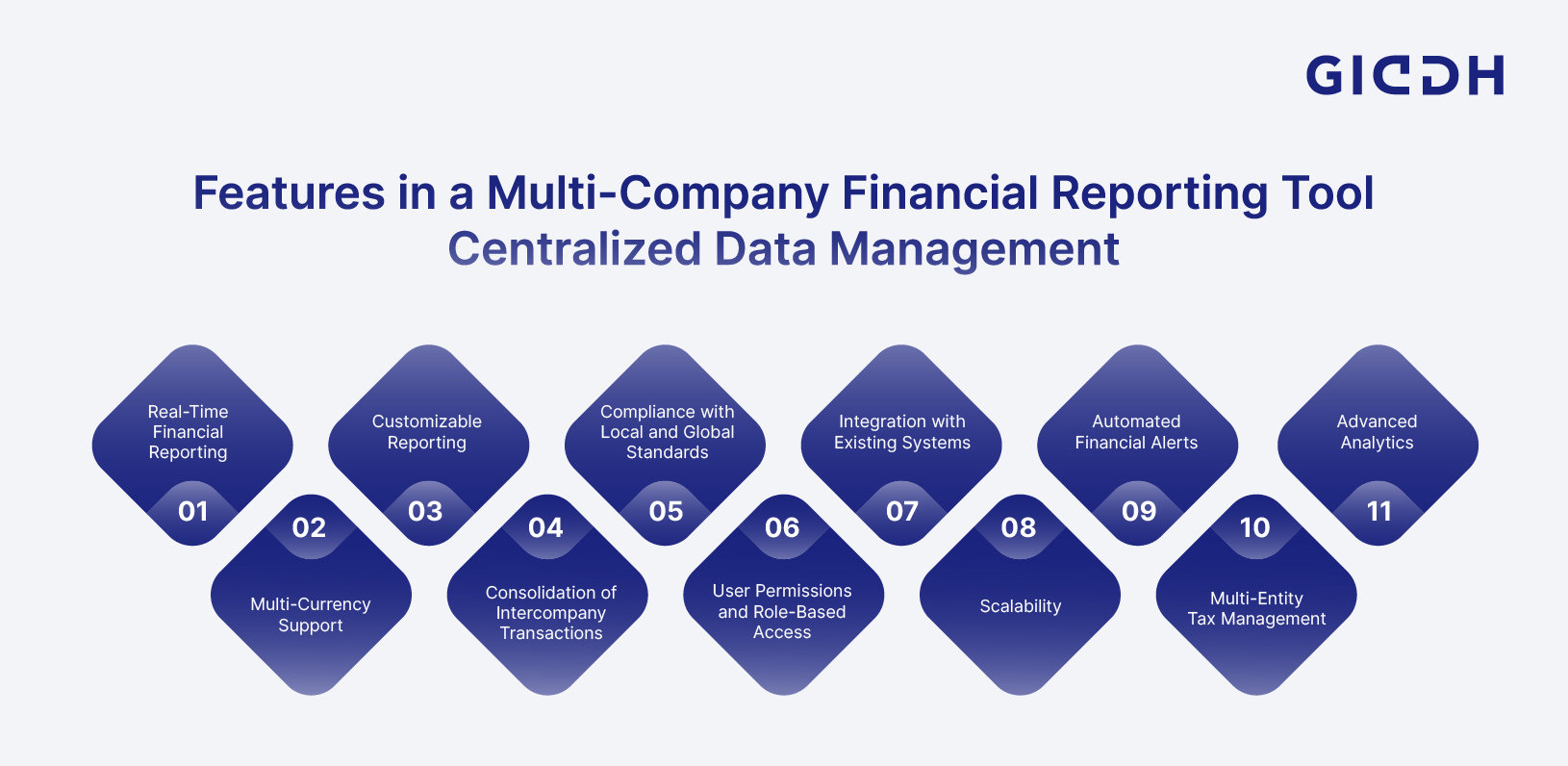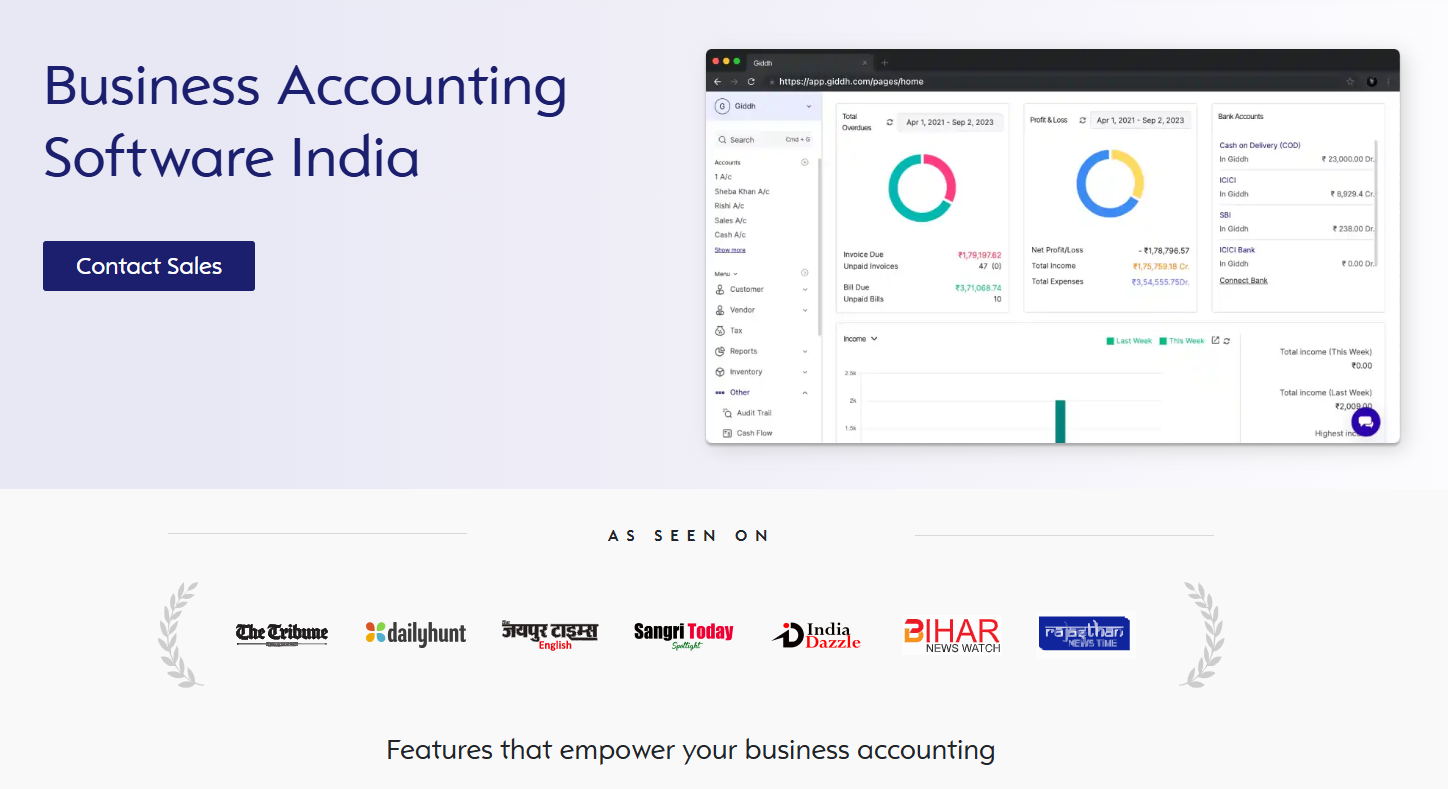Choosing The Right Multi-Company Financial Reporting Tool in India

TL;DR: Managing multi-company financial reports in India can be overwhelming for businesses, particularly due to the complexities of tax compliance, consolidation, and system integration. Choosing the right financial reporting tool can help simplify these processes. In this blog, we’ll explore how to pick the best tool tailored to Indian businesses with multiple subsidiaries, considering features like compliance with Indian tax laws (GST, TDS), automation, scalability, and ease of integration. |
In 2024, over 60% of Indian businesses faced significant challenges in handling financial data across multiple subsidiaries or branches. From manual consolidation errors to difficulty ensuring compliance with GST and TDS requirements, financial managers often find themselves overwhelmed by the complexities of multi-company reporting.
This is where a multi-company financial reporting tool becomes a game-changer. By automating processes and integrating systems, these tools ensure accuracy, efficiency, and tax compliance. Are you ready to streamline your financial reporting? Continue reading to discover how choosing the right tool can make a transformative impact on your business.
What Are The Complexities of Multi-Company Financial Reporting?
Managing the finances of multiple subsidiaries or branches under one umbrella involves complexities that go beyond simple consolidation. Here’s why it’s essential to understand these challenges:
What is Multi-Company Financial Reporting?
Multi-company financial reporting refers to consolidating financial data from multiple subsidiaries or entities into one unified system. This allows businesses to have a single view of their finances, simplifying decision-making, budgeting, and compliance processes.
For Indian businesses with diverse subsidiaries across various regions, sectors, or business models, multi-entity reporting solutions can help streamline data flow and reporting.
Challenges CFOs and Financial Managers Face:
-
Manual Consolidation Errors: Compiling financial data manually from different subsidiaries often leads to mistakes, resulting in discrepancies.
-
Compliance with Indian Tax Laws (GST, TDS): India’s tax laws, such as GST and TDS, necessitate precise calculations and reporting, which makes manual management challenging.
-
Lack of Real-Time Data Across Entities: Inaccurate or outdated data can lead to poor financial decisions and missed opportunities.
-
Difficulty in Integrating Systems: Many businesses use different systems across subsidiaries, leading to inefficiencies when consolidating data manually.
Impacts of These Challenges:
-
Errors: Mistakes in manual reports can lead to financial discrepancies, increasing audit risks.
-
Delays: Manual processes are time-consuming, leading to delayed reporting and analysis.
-
Missed Opportunities: Without real-time data, businesses miss crucial insights that could improve decision-making.
Why Does Your Business Need a Multi-Company Financial Reporting Tool?
Investing in a multi-company financial reporting tool is essential for businesses that have multiple entities. Below are the key benefits these tools offer:
Key Benefits:
-
Real-time, Consolidated Financial Data Across All Subsidiaries:
Financial data from multiple entities can be consolidated in real-time, offering a unified view of the business’s economic health. -
Tax Compliance Automation (GST, TDS, etc.):
The tool should automatically manage tax calculations and generate TDS and GST-compliance reports for regulations. -
Improved Accuracy and Reduced Manual Errors:
Automation helps eliminate errors common in manual consolidation and reporting. -
Time-Saving Through Automation and Integration:
With automated processes, businesses save time on manual entries and integrations, freeing up resources for decision-making.
Industries That Benefit:
-
Manufacturing: Inventory management and costing models require accurate reporting across multiple locations.
-
Retail: Managing financials across numerous outlets and online sales channels needs consolidation and compliance tools.
-
Services: Service-based businesses often have multiple departments or branches that need streamlined financial reporting.
What Are the Key Features to Look for in a Multi-Company Financial Reporting Tool?
When choosing the best multi-company financial reporting tool for Indian businesses, ensure it covers the following features:

Centralized Data Management
-
Why It Matters: The tool should enable you to consolidate data from multiple companies into a single platform, facilitating easier management and reporting.
-
Benefit: This saves time, reduces errors, and ensures that all companies' financial data is accessible in one place, improving overall efficiency.
Real-Time Financial Reporting
-
Why It Matters: The ability to generate real-time reports helps businesses make informed decisions quickly, especially when managing multiple companies.
-
Benefit: Up-to-date financial data enables you to spot trends, identify issues early, and manage cash flow more effectively across all companies.
Multi-Currency Support
-
Why It Matters: If you’re operating in different regions, the tool must support multi-currency transactions.
-
Benefit: This ensures accurate financial reporting for each company, regardless of the currency used, thereby simplifying global financial management.
Customizable Reporting
-
Why It Matters: Every company has unique needs and preferences when it comes to financial reports.
-
Benefit: A customizable tool enables you to tailor reports based on specific criteria, thereby meeting individual company requirements more easily and streamlining decision-making.
Consolidation and Elimination of Intercompany Transactions
-
Why It Matters: Consolidating financial statements is crucial when you have intercompany transactions that need to be eliminated for accurate reporting.
-
Benefit: It provides consolidated financials that reflect the accurate financial picture of the entire organization, excluding duplicated transactions.
Compliance with Local and Global Standards
-
Why It Matters: The tool should comply with local tax laws and international financial reporting standards (IFRS, GAAP).
-
Benefit: This ensures that reports are accurate, legally compliant, and meet regulatory requirements across different regions and countries.
User Permissions and Role-Based Access
-
Why It Matters: Security and privacy are paramount when handling financial data across multiple companies.
-
Benefit: Role-based access controls ensure that only authorized users can access sensitive data, minimizing the risk of unauthorized access or errors.
Integration with Existing Systems
-
Why It Matters: The tool should integrate seamlessly with your existing accounting, ERP, and other business systems.
-
Benefit: This minimizes the need for manual data entry, reduces the risk of errors, and enhances overall workflow efficiency.
Scalability
-
Why It Matters: As your business expands, the tool must scale to support additional companies, entities, and transactions.
-
Benefit: A scalable solution ensures that the tool continues to meet your needs as you expand, without requiring a complete system overhaul.
Automated Financial Alerts and Notifications
-
Why It Matters: Automated alerts can notify you of important financial events, such as large transactions or budget overruns, across multiple companies.
-
Benefit: This helps you stay proactive and avoid financial surprises by keeping you informed about potential issues.
Multi-Entity Tax Management
-
Why It Matters: Managing taxes across different entities can be complex, especially when dealing with various jurisdictions and tax rates.
-
Benefit: A tool that helps you manage taxes across multiple entities ensures compliance, reduces errors, and simplifies tax reporting.
Advanced Analytics and Forecasting
-
Why It Matters: The tool should offer advanced analytics and forecasting capabilities, including financial modeling, trend analysis, and predictive insights.
-
Benefit: This helps with better long-term financial planning and more accurate forecasting across the entire organization.
How Do You Choose the Right Multi-Company Financial Reporting Tool for Your Business?
Selecting the ideal tool is essential to meet your financial reporting needs and scale your business operations. Here’s a step-by-step guide to making the right choice:
Step-by-Step Guide to Selecting the Right Tool:
Assess Your Business Needs:
What is the size of your business, and how many subsidiaries do you have?
Understand the complexity of your financial operations and reporting needs.
Consider the Compliance Features:
Does the tool automate GST, TDS, and other compliance requirements specific to Indian businesses?
Evaluate Integration Capabilities:
Can the tool integrate seamlessly with your current ERP, best accounting systems, and other business management tools?
Check Scalability:
Will the tool grow with your business as you add more subsidiaries or branches?
Ensure User-Friendliness:
Choose a tool that is intuitive for your finance team, with minimal learning time.
Want a Solution That Checks All the Boxes?
If you’re looking for a comprehensive multi-company financial reporting tool that caters specifically to Indian businesses, Giddh could be the perfect solution. Keep reading to see how Giddh can streamline your reporting process.
How Giddh Can Help Streamline Your Multi-Company Financial Reporting
Giddh is a leading multi-company financial reporting tool tailored to meet the needs of Indian businesses. It helps automate GST, TDS, and other tax calculations, ensuring compliance with Indian regulations. Giddh consolidates real-time financial data across subsidiaries, saving time and minimizing errors.
Key Features of Giddh:
-
Automatic Tax Calculations and Reports: Supports seamless GST and TDS reporting.
-
Real-Time Data Consolidation: Consolidates financial data across all subsidiaries automatically.
-
Integration with Existing Systems: Easily integrates with popular ERP and accounting software.
-
Scalable Platform: Designed to grow with your business.
Benefits:
-
Time-Saving: Automates tax filing and data consolidation processes.
-
Accuracy: Eliminates manual errors and improves financial reporting.
-
Informed Decision-Making: Provides actionable insights for better strategic planning.
Common Mistakes to Avoid When Choosing a Multi-Company Financial Reporting Tool
-
Choosing a Tool Without Proper Integration Capabilities:
Integration is key to ensuring data flows seamlessly from your existing systems. -
Ignoring Scalability:
Select a tool that can grow as your business expands, avoiding the need to change systems in the future. -
Overlooking Compliance Support:
Tax compliance is a priority in India, and your tool should handle GST, TDS, and other local regulations. -
Selecting a Tool Too Complex for Your Team:
A complex tool can lead to user errors. Ensure it’s easy to use. -
Underestimating the Importance of Real-Time Reporting:
Make sure the tool can provide accurate, up-to-date financial reports.
Conclusion:
Selecting the appropriate multi-company financial reporting tool is essential for businesses with multiple subsidiaries or branches in India. The right tool will not only help you stay compliant with Indian tax laws, but it will also save you time, reduce errors, and provide accurate, real-time financial insights.
With features like automated tax reporting, scalability, and seamless integration, tools like Giddh can be a game-changer for businesses looking to streamline their financial reporting processes.
Ready to take control of your financial reporting? Explore Giddh today and see how we can help you simplify and automate your processes.
FAQs
1. What features should I look for in a multi-company financial reporting tool?
Look for automation of tax calculations (GST, TDS), scalability, real-time data consolidation, integration with existing systems, and ease of use.
2. Can multi-company reporting tools handle Indian GST and compliance requirements?
Yes, the best multi-entity reporting solutions are designed to automate compliance with Indian tax laws, including GST and TDS reporting.
3. How does a multi-entity financial reporting tool simplify accounting for businesses in India?
It automates consolidation, ensures compliance with tax laws, and provides real-time financial data across subsidiaries, saving time and reducing errors.


